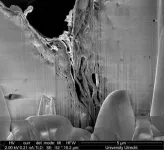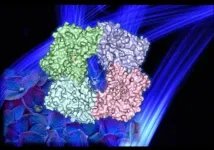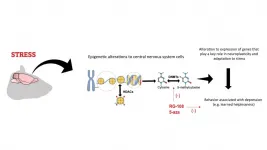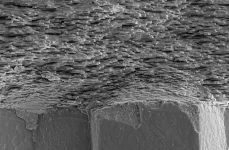More women embracing 'going flat' after mastectomy
UCLA researchers find women choosing not to have reconstruction surgery are satisfied with their outcome
2021-01-04
(Press-News.org) LOS ANGELES -- A growing number of women forgoing reconstruction after a mastectomy say they're satisfied with their choice, even as some did not feel supported by their physician, according to a study led by researchers at the UCLA Jonsson Comprehensive Cancer Center.
The study, published in the Journal Annals of Surgical Oncology, surveyed 931 women who had a unilateral or bilateral mastectomy without current breast mound reconstruction to assess the motivating factors for forgoing the procedure and to measure whether surgeons provided adequate information and support for "going flat."
Out of the women surveyed, 74% were satisfied with their outcome and 22% experienced "flat denial," where the procedure was not initially offered, the surgeon did not support the patient decision, or intentionally left additional skin in case the patient changed her mind.
The team also explored reasons given for the choice and found women pointed to a desire for a faster recovery, avoidance of a foreign body placement and the belief that breast mound reconstruction was not important for their body image.
"Undergoing a mastectomy with or without reconstruction is often a very personal choice," said Dr. Deanna Attai, an assistant clinical professor of surgery at the David Geffen School of Medicine at UCLA, and senior author of the study. "We found that for a subset of women, 'going flat' is a desired and intentional option, which should be supported by the treatment team and should not imply that women who forgo reconstruction are not concerned with their post-operative appearance."
The results challenge past studies showing that patients who chose not to undergo breast reconstruction tend to have a poorer quality of life compared with those who do have the surgery.
Attai and her team found that a majority of patients who elected to go flat were in fact satisfied with their surgical outcome. The authors believe the survey tool commonly used to asses outcomes was biased towards reconstruction. To avoid that bias, Attai partnered with patient advocates to develop a unique survey to assess reasons for going flat, satisfaction with their decision, and factors associated with satisfaction. They also identified concerns unique to these patients not captured by other validated surveys.
While a majority of the women surveyed reported they were satisfied with their surgical outcomes, 27% of patients surveyed reported not being satisfied with the appearance of their chest wall.
"Some patients were told that excess skin was intentionally left -- despite a preoperative agreement to perform a flat chest wall closure -- for use in future reconstruction, in case the patient changed her mind," said Attai, who is a member of the UCLA Jonsson Comprehensive Cancer Center. "We were surprised that some women had to struggle to receive the procedure that they desired."
Surgeons may hesitate to recommend mastectomy without reconstruction surgeons due to being less confident that they can provide a cosmetically acceptable result for patients who desire a flat chest wall, noted Attai.
"We hope that the results of this study will serve to inform general and breast surgeons that going flat is a valid option for patients, and one that needs to be offered as an option," said Attai. "We also hope the results may help inform patients that going flat is an option, and to empower them to seek out surgeons who offer this option and respect their decision."
INFORMATION:
In addition to Attai, study co-authors were Dr. Jennifer Baker, Dr. Carlie Thompson, Dr. Minna Lee and Dr. DiNome of UCLA; Dr. Don Dizon of the Brown University and the Lidespan Cancer Institute; and Dr. Cachet Wenziger and Dr. Elani Streja of the University of California Irvine School of Medicine.
ELSE PRESS RELEASES FROM THIS DATE:
2021-01-04
Of the 5,300 children enrolled in the Ohio Behavioral Health Juvenile Justice Initiative since 2006, 21% reported that someone close them had been murdered in the past year. Nearly half of the boys and more than a quarter of the girls in the program have both a substance abuse and mental health disorder.
But there's good news, too: From 2017 through 2019, 81% of the participants--aged 10 through 17--successfully completed the state's juvenile diversion program, and data indicated that 79% of youth reduced their contact with police while in treatment.
Those findings are from a new detailed evaluation of the Ohio Behavioral Health Juvenile Justice Initiative (BHJJ) by researchers at the Jack, Joseph and ...
2021-01-04
Boulder, Colo., USA: Europe's largest gas field, the Groningen field in the Netherlands, is widely known for induced subsidence and seismicity caused by gas pressure depletion and associated compaction of the sandstone reservoir. Whether compaction is elastic or partly inelastic, as implied by recent experiments, is key to forecasting system behavior and seismic hazard.
Bart Verberne and colleagues sought evidence for a role of inelastic deformation through comparative microstructural analysis of unique drill-core, recovered from the seismogenic center of the field in 2015, 50 years after gas production started, versus core recovered before production (1965). Quartz grain fracturing, crack healing, and stress-induced Dauphiné twinning are ...
2021-01-04
BOSTON - A long-running debate over how an important gene-silencing protein identifies its targets has been resolved by researchers at Massachusetts General Hospital (MGH). Their findings, reported in Nature Structural and Molecular Biology, also explain certain mysteries about the behavior of this protein, known as Polycomb repressive complex 2 (PRC2).
PRC2 helps regulate whether genes are active ("on) or silent ("off"). PRC2's role in gene silencing is critical throughout the lifespan, from embryo formation to old age. For example, PRC2 determines whether genes that suppress the growth of malignant tumors are turned on or off, which has made it the focus of pharmaceutical companies ...
2021-01-04
If you've ever had a bad case of jet lag, you know how a disruption to your body's circadian rhythm makes it difficult to function. Molecular circadian "clocks" exist in cells throughout the body, governing more than just sleep and wake cycles - they are crucial to many aspects of human health. For more than a decade researchers have been trying to figure out what makes them tick, in search of new insights into diseases like Alzheimer's, cancer and diabetes.
Until now, that research has focused on what is known as clock genes, which encode proteins that drive oscillating cycles of gene expression affecting physiology and behavior. But research just published in the Proceedings of the National Academy of Sciences reveals the discovery ...
2021-01-04
Plants can perceive and react to light across a wide spectrum. New research from Prof. Nitzan Shabek's laboratory in the Department of Plant Biology, College of Biological Sciences shows how plants can respond to blue light in particular.
"Plants can see much better than we can," Shabek said.
Plants don't have dedicated light-detecting organs, like our eyes. They do have a variety of dedicated receptors that can sense almost every single wavelength. One such are the blue light photoreceptors called cryptochromes. When the cryptochrome detects an incoming photon, it reacts in a way that triggers a unique physiological response.
Cryptochromes probably appeared billions of years ago with the first living ...
2021-01-04
By Karina Ninni | Agência FAPESP – Treatment of depression faces two main challenges. The first is that almost 50% of patients do not respond well to existing antidepressants. The second is that conventional medications take a relatively long time – around three to five weeks – to have the desired effect. A group of researchers affiliated with the University of São Paulo (USP) in Brazil set out to tackle the second problem by using epigenetic modulators to try to “erase” the consequences of stress. Epigenetic mechanisms are part of a complex system that controls how and when genes are switched on or off.
Exposure to stress, a key trigger of depression, alters certain epigenetic markers in the brain. Many of these alterations ...
2021-01-04
The coronavirus pandemic is creating a large spike in significant psychological distress among Americans, with the first month of the pandemic causing as much distress in the same number of individuals that experienced it during the whole previous year, according to a new RAND Corporation study.
Findings from the first longitudinal study of psychological distress during the pandemic show that among a representative sample of Americans, more than 10% reported experiencing symptoms of significant psychological distress during April and May of 2020 -- the same amount they reported experiencing over an entire year during a survey conducted a year earlier.
The study also found that people with distress prior to the ...
2021-01-04
Scientists have long been aware of the dangerous overuse of antibiotics and the increasing number of antibiotic-resistant microbes that have resulted. While over-prescription of antibiotics for medicinal use has unsettling implications for human health, so too does the increasing presence of antibiotics in the natural environment. The latter may stem from the improper disposal of medicines, but also from the biotechnology field, which has depended on antibiotics as a selection device in the lab.
"In biotech, we have for a long time relied on antibiotic and chemical selections to kill cells that we don't want to grow," said UC Santa Barbara chemical engineer Michelle ...
2021-01-04
Following the repeal of the short-lived Cook County, Illinois Sweetened Beverage Tax, sales of sweetened beverages went right back to where they were before the tax went into place, according to a new study led by researchers at the University of Illinois Chicago. The study is published in JAMA Network Open.
The tax, which included both sugar-sweetened and artificially-sweetened diet beverages, was largely pitched as a way to reduce county budget deficits. The tax lasted just four months -- it went into effect on Aug. 2, 2017 and ended on Dec. 1, 2017.
"We ...
2021-01-04
Mollusks build shells to protect their soft tissues from predators. Nacre, also known as the mother of pearl, has an intricate, highly regular structure that makes it an incredibly strong material. Depending on the species, nacres can reach tens of centimeters in length. No matter the size, each nacre is built from materials deposited by a multitude of single cells at multiple different locations at the same time. How exactly this highly periodic and uniform structure emerges from the initial disorder was unknown until now.
Nacre formation starts uncoordinated ...
LAST 30 PRESS RELEASES:
[Press-News.org] More women embracing 'going flat' after mastectomy
UCLA researchers find women choosing not to have reconstruction surgery are satisfied with their outcome




